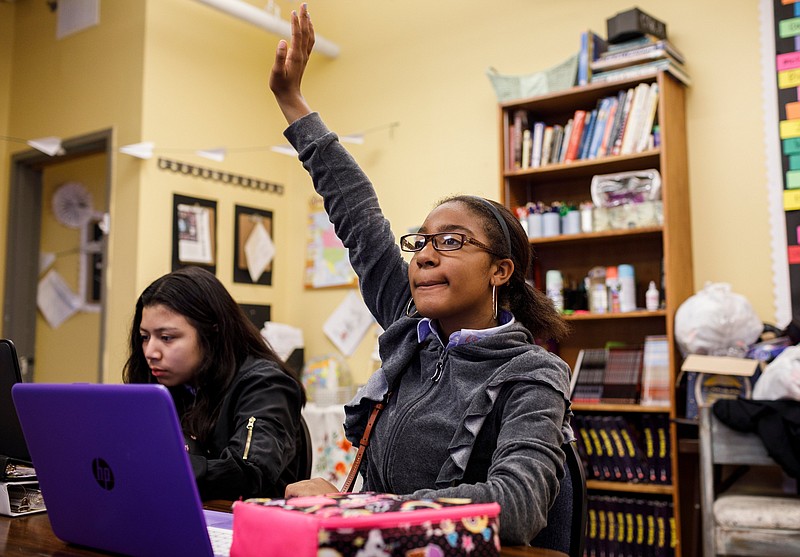Parents are clearly looking for something better when it comes to education for their children - as long as someone else pays for it, an annual national poll on education by a Harvard University subsidiary reveals.
While more Americans have a positive view of their local public school than at any time since 2007, according to the Education Next poll, support for vouchers and tax credit scholarships for private school tuition also has risen. The poll also finds that support for teacher pay increases is higher than at any point since 2008, that the public is more supportive of increased federal government spending on K-12 education than by state and local governments, and that free, public, two-year and four-year college tuition is favored by 69% and 60% of respondents, respectively.
Before we scratch the surface of some of the findings, we believe respondents to this poll - like many Americans in general - have no concept of federal government spending. They don't know what it's spent on, what it's not spent on, and why it spends more on some things and state and local governments more on some things.
Unfortunately, to many, the federal government is just a nebulous piggy bank with unlimited resources. They have no idea the country is $22 trillion in debt or what that means for future economic policy.
So, we look at these results with just a bit of a jaundiced eye because the answers weren't given in absolutely reality.
However, we do believe some of the aforementioned results are what they are because of individual respondents' own economic outlooks. If respondents are doing better economically (and they are), it stands to reason their local public school is doing better economically (reaping more state and local funds), that they believe their local governments can afford to pay teachers more, and that the nebulously wealthy federal government must be doing better and thus be able to pay for public college tuition for those who want it.
That said, the survey tells us 60% of respondents would give their local public schools a grade of A or B, a rise of 9 percentage points over 2018.
If the survey were conducted strictly in Hamilton County, we believe the results even might be higher. Although Hamilton County commissioners recently turned down a 34-cent property tax increase to help fund educational operations, many in the public and even several commissioners voiced support both for teacher pay increases and for more money for operations, if not the full 34 cents.
Plus, the recent positive news about 2018-2019 state test scores only backs the improved feeling county residents have about the direction of the school district under Superintendent Dr. Bryan Johnson.
Nevertheless, we believe Hamilton Countians and parents of school children across the nation are looking for options, for choice.
The survey found 55% of adults support vouchers allowing them to enroll their children in private schools, with the government paying for part of the tuition. That's up 10 percentage points since 2016.
Support for targeted vouchers - to low-income families - rose even more, going from 37% in 2016 to 49% today. What's more is the support came from 66% of black respondents, 69% of Hispanic respondents and even 52% of Democrat respondents.
The support for tax credit scholarships - tax credits for individual and corporate donations to help low-income parents pay for scholarships to private schools - increased 5 percentage points from 2016 to 58% in 2019. Almost all demographic groups cited showed more than 50% support.
Meanwhile, support for charter schools - publicly funded schools not managed by local school boards - has climbed back to 48% after falling to 39% in 2017, when the nominee for U.S. Secretary of Education, Betsy DeVos, was demonized by the left for her support of charter schools. In the 2019 poll, charters are backed by 55% of black respondents and 51% of Hispanics.
However, the survey also shows the public has a serious misconception about charter schools, one we believe has been sown by public school-or-die advocates. And, the survey shows, little has changed in such misconceptions since 2012.
In 2019, for instance, only 26% (up from 24% in 2012) of respondents knew charter schools could not charge tuition, and only 22% (the same as in 2012) knew charter schools could not hold religious services.
We believe, sadly, many Hamilton Countians would have similar misconceptions about charter schools, three of which were deemed "reward schools" by the state for their academic achievement and/or improvement during the 2018-2019 school year.
The Tennessee General Assembly, during its 2019 session, approved a limited Educational Savings Account, a voucher-type program for low-income students in Davidson and Shelby counties beginning in the 2020-2021 school year. We have supported similar educational choice legislation in the past, and we hope the students take advantage of it.
And we'll be interested to see how the desire for educational support - if paid for by someone else - plays out across the country.
